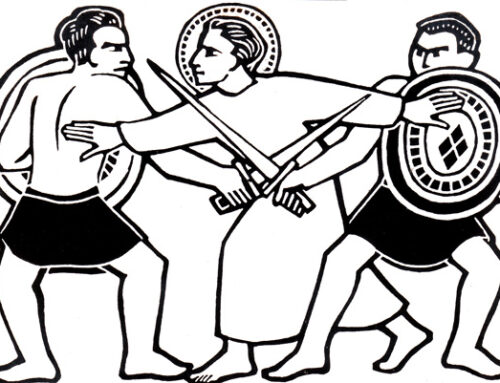Action: Putting Justice Into Practice
December 9, 2016
Categories: Justice
This blog post is Part 12 in a 12-part blog series on Christianity and justice. (If you missed the first post, you can find it here.) We have reached the final step—putting justice into practice. Consider the example of Jesus—he didn’t just think about justice, talk about justice, or vote in a way that aligned with justice—he actually did justice.
In the same way, it isn’t enough for us to think, talk, vote, or have a social media presence that is supportive of justice—we need to put our values into action. If you have done the groundwork of becoming educated and developing relationships with others who are working on the same justice causes you are interested in, the action part may feel like a natural next step. The key is to find the intersection of (a) the needs and (b) your interests and abilities.
The first part of this equation is figuring out what the greatest needs are. The easiest way to do this is to ask. If there is an organization that is working on the justice issue you are interested in, ask what their needs are. Non-profit organizations often have continuing needs for volunteers in a variety of areas. Sit down and have a discussion about what the needs are. What would make the most impact right now?
The second part of this equation is determining your interests and abilities. If you try to help in a task that isn’t matched with your interests and abilities, you might get frustrated and quit. But if you can find a task that is a good fit for your interests and abilities, you are more likely to be successful at your task and enjoy the process.
In his letter to the church in Corinth, Paul talks about how each person is given a spiritual gift in order to do all kinds of good works.
There are different kinds of gifts, but the same Spirit distributes them. There are different kinds of service, but the same Lord. There are different kinds of working, but in all of them and in everyone it is the same God at work.
Now to each one the manifestation of the Spirit is given for the common good. To one there is given through the Spirit a message of wisdom, to another a message of knowledge by means of the same Spirit, to another faith by the same Spirit, to another gifts of healing by that one Spirit, to another miraculous powers, to another prophesy, to another distinguishing between spirits, to another speaking in different kinds of tongues, and to still another the interpretation of tongues. All these are the work of one and the same Spirit, and he distributes them to each one, just as he determines (1 Corinthians 12:4-11).
One helpful way to organize your thinking about your interests is called the Holland Codes, named after an organizational psychologist named John Holland. He said that people’s job interests generally fall into five categories. The categories can be remembered by the acronym RIASEC:
- People who have realistic interests tend to prefer things rather than ideas or people, being outdoors, using tools, operating machines, and working with their hands.
- People who have investigative interests prefer activities that involve thought, observation, investigation, exploration, and discovery.
- People who have artistic interests prefer to work with ideas, abstractions, and concepts, and enjoy work that is literary, verbal, visual, and aesthetic.
- People who have social interests prefer tasks that involve socializing, helping others, teaching, teamwork, social interaction, and relationship building.
- People who have enterprising interests prefer work that involves leadership, business, politics, public speaking, being in charge, taking risks, debating, and competing.
- People who have conventional interests prefer work that involves accounting, statistics, mathematics, numerical activities, and office settings.
When you consider your own life and interests, what category describes your interests the best? It could be helpful to find a way to help that fits your interest area.
In addition to thinking about your interests, it is important to consider your abilities. If you have interest in a particular area, but you don’t have the required skills, it may be difficult for you to contribute in this area. That said, skills can be developed over time, and one of the benefits of volunteering is the ability to develop new skills. So don’t cross an activity off your list just because you aren’t good at it yet. However, you may find it more enjoyable to contribute in an area that you are good at.
The justice cause you want to help likely has a specific set of needs, and you bring a unique set of interests and abilities to the table. The key when moving forward into action is to find the overlap of the need and your interests/abilities. That is the place where you will be most effective and experience the most enjoyment in your work.
Discussion: What are the needs of the justice cause you want to help? What interests and abilities do you bring to the table? Where is the overlap between the two?
Related Thoughts

Subscribe To My Newsletter
Join my mailing list to receive the latest blog posts.
Receive my e-book “The Mental Health Toolkit” for free when you subscribe.





